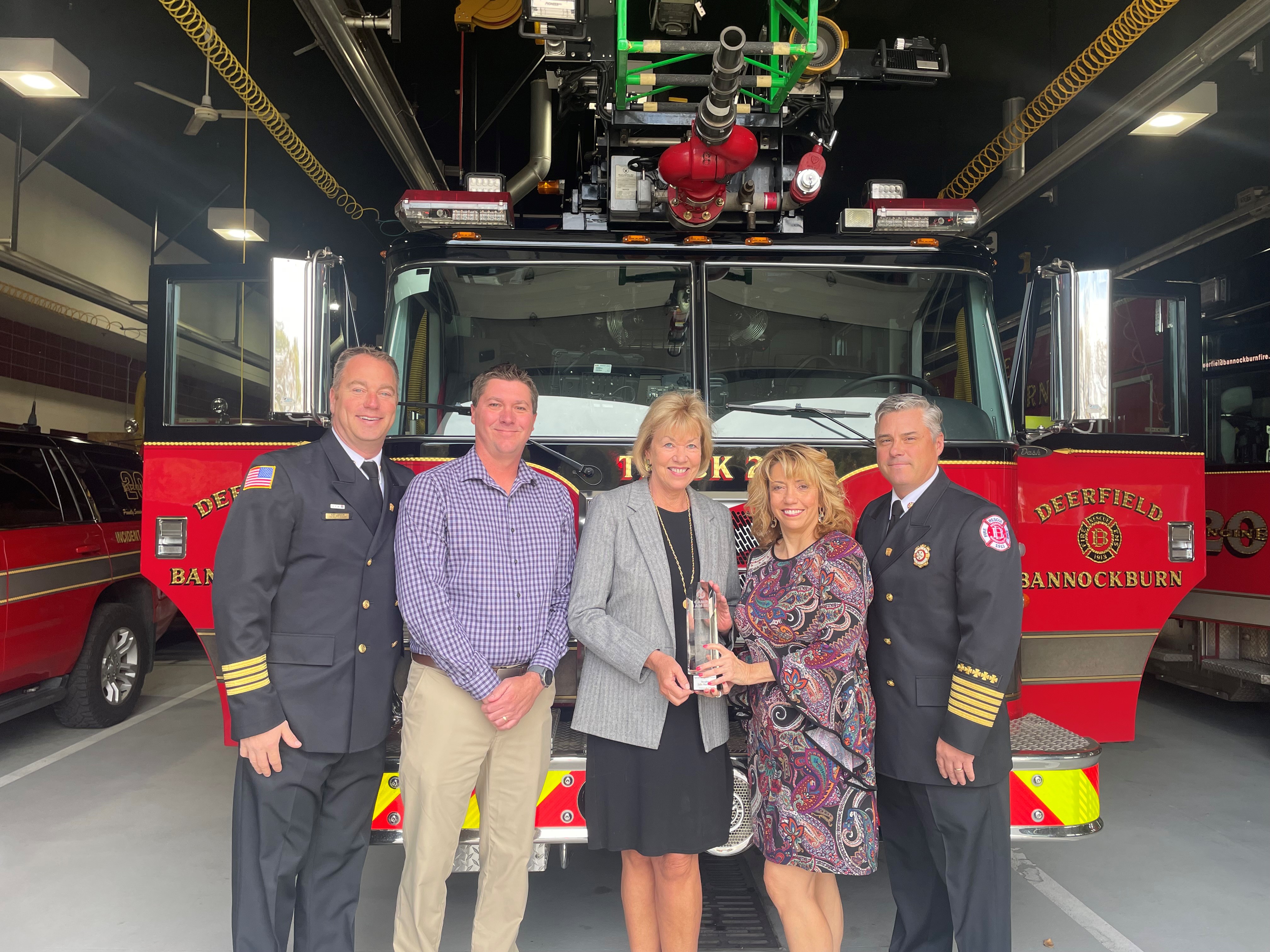Morrison receives award from Illinois Fire Safety Alliance
- Details
- Category: Latest

LAKE FOREST – State Senator Julie Morrison received an award from the Illinois Fire Safety Alliance for her efforts to fight for increased safety against fireworks.
“As a state senator, my highest priority has always been the safety and well-being of our community,” said Morrison (D-Lake Forest). “The ongoing battle against fireworks legalization bills is about protecting lives, property, and the peace of mind of our residents.”
Morrison was presented with the Special Recognition Award for her ongoing commitment to fires safety measures and going above and beyond as an outspoken opponent on the expansion of fireworks sales across the state of Illinois. Her passion is present when educating the public, and other legislators, on the dangers of these life-threatening devices.
Morrison will continue to advocate for measures to keep communities safe.
Morrison to host mobile Secretary of State event
- Details
- Category: News

LAKE FORESET – State Senator Julie Morrison is hosting a mobile Secretary of State event in Lake Forest, which will give area residents the opportunity to access some Secretary of State services at a location in the community, rather than visiting a Secretary of State facility.
“The Mobile Unit makes it easier for some to receive necessary services at a convenient location,” said Morrison (D-Lake Forest). “Spots are very limited, so make an appointment today.”
The event will be held on Wednesday, Nov. 6 from 10 a.m. – 2 p.m. at the Lake Forest City Hall – located at 220 E. Deerpath Rd. – in the City Council Chambers. Appointments are required and limited to 48 and must be made by calling Senator Morrison’s office at 847-945-5200. Walk-ins are not guaranteed service.
The ability to apply for a first-time Real ID at mobile events was recently added to the list of services available through the Mobile Unit. Other services that will be available are
- Driver’s Licenses (Renewal, Duplicate, Corrected)
- State ID Cards (First Time, Renewal, Duplicate, Corrected) (no fee for ages 65 and older.)
- Vehicle Registration Stickers (expiring within the current year)
- Organ and Tissue Donor/Voter Registration with License or ID Application. (Not available as a standalone service)
Proper documentation must be provided in order for Mobile Unit staff to accept license and ID applications for processing. A chart of acceptable documents may be found at https://www.ilsos.gov/publications/pdf_publications/dsd_x173.pdf
Accepted forms of payment are Visa, Mastercard, AMEX, Discover Credit, and Debit cards. Personal check or money order for the exact amount due for services dated on the date of the transaction.
No written or road exams will be administered. Drivers aged 78 and older will need to visit a Secretary of State facility to renew their driver’s license.
Morrison brings lifesaving, hands on emergency training to residents
- Details
- Category: Latest

DEERFIELD – State Senator Julie Morrison is teaming up with the Deerfield-Bannockburn Fire Department to teach residents of all ages how they can help their friends, family, neighbors and others with emergency medical treatment before the professional paramedics arrive.
“Being equipped with basic skills to help during a medical emergency can save a life," said Morrison (D-Lake Forest). "In the event that you should be called upon to provide assistance to someone in distress, this event is the perfect opportunity to introduce you to important life saving techniques."
The event will be held Saturday, Nov. 2 from 10 a.m. to 2 p.m. at the Deerfield Bannockburn Fire Department located at 500 Waukegan Road in Deerfield. The fire department will host a number of informational stations including hands-only CPR, "Stop the Bleed," calling 911, and choking training.
The fire department will also be hosting a blood drive from 9 a.m. to 3 p.m. To make an appointment to donate, click here.
“This event is special in nature as typical fire department open house events showcase the fire department’s resources,” said Chief Ian Kazian. “This event provides hands-on training by paramedics to our residents and guests of our fire district.”
The event is free and open to the public – and light refreshments will be served. People of all ages are encouraged to attend. Residents with questions can call Morrison’s office at 847-945-5200.
Lake County to see additional workforce training thanks to Morrison
- Details
- Category: Latest

HIGHWOOD – State Senator Julie Morrison joined the Illinois Department of Commerce and Economic Opportunity in announcing $15 million in funding for the Job Training and Economic Development program, including more than $560,000 for Openlands Lakeshore Preserve in Lake County.
"Programs such as JTED play a crucial role in preparing a skilled workforce and offering opportunities to those struggling to find employment," stated Morrison (D-Lake Forest). "By delivering education, skills, and training, we not only support individuals in their long-term success but also contribute to the strength of our communities and foster a thriving economy."
The Job Training and Economic Development program provides workforce training and wraparound services to help bolster equitable workforce recovery for Illinoisans struggling to gain meaningful employment. Funds from this program aim to address the economic impacts experienced by employers and individuals who are underemployed, unemployed or underrepresented who have one or more barriers to employment that are identified as risk factors.
This is the second round of funding from the JTED program, awarding over $15 million to 33 organizations across Illinois. Openlands Lakeshore Preserve, which falls within Morrison’s district, is set to receive over $562,000 from the program.
“The continued success of the JTED program is a testament to the importance of intentional investments in Illinois’ world-class workforce,” said DCEO Director Kristin Richards. “This funding will support services to underemployed, unemployed and underrepresented communities and provide individuals access to good paying job opportunities.”
More Articles …
Page 16 of 134





